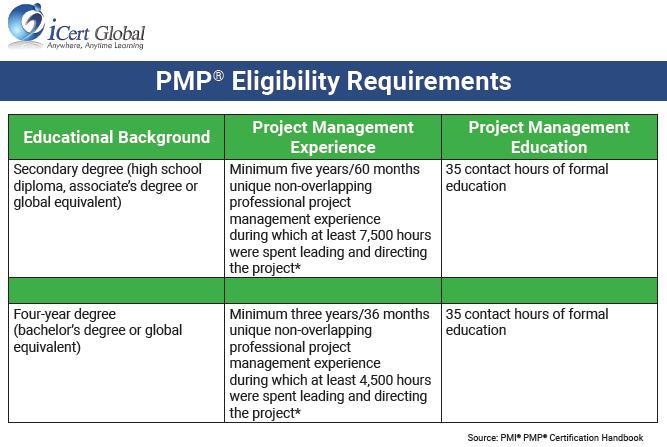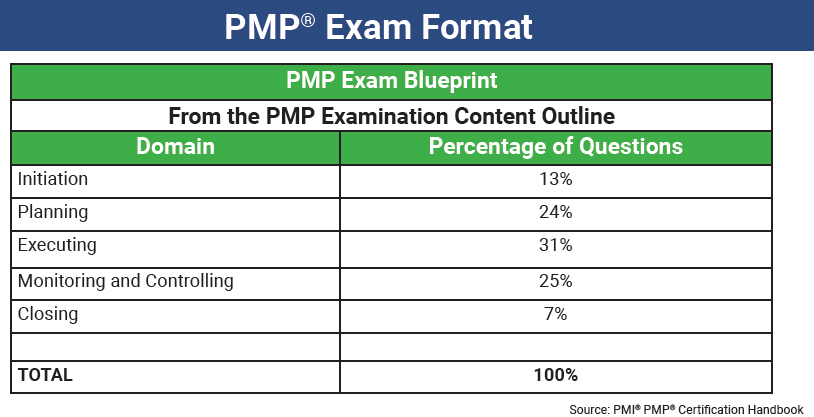
:
Four Steps To Follow To Clear The PMP Exam In Your First Attempt
Project Management Professional (PMP®️) Certification is the most valuable certification in the field of project management due to its relevance, demand and trend in the market. It is accredited by the Project Management Institute (PMI®️). According to PMI, PMP is considered as the gold standard of project management certifications and applies to project management in general. Therefore PMP commands the same reverence in any industry.
The four steps you need to follow to clear the PMP exam are:
1. Know everything about eligibility criteria
2. Record your Project Management experience
3. Prepare for PMP exam and manage your time
4. Plan effectively during an exam
1. Know everything about eligibility criteria
According to PMI’s PMP Handbook, the following table shows the eligibility criteria to attempt the PMP exam.

PROJECT MANAGEMENT EXPERIENCE
4500 or 7500 hours in leading and directing projects can be defined as an experience in any role which falls under project management processes.
- Initiating
- Planning
- Executing
- Monitoring and Controlling
- Closing
A leading or directing role can be,
- Supervisor
- Team leader
- Assistant project manager
- Project Manager
- Project coordinators
- Any role participating in project management processes
You need references related to all the projects and validation by your reporting manager to experience and description to qualify the audit process.
If you fail the audit process, there is a one-year suspension period to apply for that certification again.
It is not necessary to have” Project Manager” designation in all the projects you worked on.
4500 or 7500 hours of experience can include all the experience you worked in project management processes. For every project, you do not need to have experience in all five process groups.
In PMI’s PMP handbook, it is mentioned that the experience does not necessarily have to be paid work, but it does need to be in a professional setting.
PROJECT MANAGEMENT EDUCATION
35 contact hours of project management education is a formal education that addresses the learning objective of project management in terms of hours. It can be attained by any mode of training such as classroom training, online training or e-learning.
You need to document your 35 hours of ‘contact hours’ prior to filling the PMP application.
35 hours of project management education is mandatory for both a four-year degree holder and a high school graduate.
35 hours of project management education helps you to understand the fundamentals of A Guide to the Project Management Body of Knowledge (PMBOK® Guide) on which the PMP exam is based.
You can attain 35 contact hours of project management by taking up professional courses, workshops and training sessions offered by,
- PMI registered education providers (R.E.P.s)
- Employer/ company-sponsored programs
- Training companies or consultants
- Distance-learning companies, including an end-of-course assessment
- University/college academic and continuing education programs
- PMI Chapters
What does not count as contact hours?
- PMI Chapter meeting with no learning activity.
- Self-study
- Management degree or post-graduation in management which cannot be mapped in project management knowledge
You need documents related to project management education to qualify the audit process.
If you fail the audit process, there is a one-year suspension period to apply for that certification again.
2. Record your Project management experience
Project management experience is required to be filled in hours. The qualifying hours are based on five domains of project management- Initiating, planning, executing, controlling and monitoring, and closing.
The qualifying hours of project management experience is to be filled for each project with respect to domains. PMI rejects the application if you do not explain your project management experience and project individually. It is time consuming and critical process. PMI provides 90 days to fill the application form.
It is advised to work on qualifying hours in a spreadsheet or in table format to record your project management experiences clearly.
You can use the following calculation to record your experience in hours:
Project hours = Average number of working days in a month x Average number of productive hours a day x Number of months worked on that project
- There are only 8 hours in a day.
- Five days and therefore 40 hours in a workweek
- Deducting the vacations that are around 2 weeks in a calendar year leaves us with 50 workweeks.
- 50 workweeks translate to 2000 hours in a year.
- PMI recognizes only the first 40 hours each week.
- Non-overlapping hours cannot be accounted for.
- Therefore, the total experience required works out to 4500 hours or 3 years.
The process of filling project management experiences in a PMP application form requires 5 sets of information.
- Project information
- Industry you worked
- Project title
- Start and end date of the project
- Role or Designation
- Start and end date of the project
|
Project |
Industry |
Start Date |
End Date |
Designation |
Contact Information |
Domains |
Hours |
|
|
|
|
|
|
|
Initiating |
|
|
Planning |
|
||||||
|
Executing |
|
||||||
|
Monitoring and controlling |
|
||||||
|
Closing |
|
- Details of the organizations (if multiple) you work/worked.
- Reference contact in each organization
- Hours of project management experience per each domain
- Summary of Project management experience
Fill the PMP application form step by step as given in our blog post: The Step By Step Procedure To Fill The Application Form
3. Prepare for PMP exam and manage your time
Preparation is the most critical factor in becoming a certified Project Management Professional (PMP). Depending on the prerequisites and preparedness it is possible to get a PMP certification in 8 to 12 weeks after applying to PMI.
The PMP exam covers the basic principles of the 5 Project Management Process Groups. Initiating, Planning, Executing, Monitoring and Controlling, and Closing. It is based on the content in PMI’s PMBOK (Product Management Body of Knowledge) Guide. Please note that PMBOK is one of the reference materials for the PMP certification exam. You need to spend time on other study materials to better prepare yourself. For your information, the reference for the current PMP exam is the sixth edition of the PMBOK, published in 2017.
The PMP exam covers the following five domains. The focus on the domains is not equally spread and going by the details presented below, the emphasis on some domains is higher than others in the exam.

The difficulty of the PMP exam lies in your ability to become acquainted with the concepts and course of study. While the domains cover the fundamentals of project management, there are 10 knowledge areas considered the core of project management. For a detailed breakdown of the domain, please check the PMP exam content outline.
4.Plan effectively during an exam
The exam format for the PMP exam is quite challenging to clear. The PMP exam is multiple choice and consists of 200 questions. Not all the 200 questions are counted. Only 175 out of the 200 are graded. The balance 25 are “pretest questions” which will not be counted for scoring.
- The 25 questions are spread across the 200 questions and you will not know which is the “pretest question”.
- You might spend too much on a “pretest question” for which there is no score.
- If the pretest question happens to be difficult, it might adversely impact the morale and confidence in your overall performance.
So, it is advisable not to waste time on only one question if you are not sure. Go ahead and solve all the answers which you surely know.
The time limit for the PMP exam is 4 hours. 1.2 minutes per question. There is no negative marking. Plan accordingly.
There are no scheduled breaks during the exam, although you are allowed to take a break if needed.
Remember all the points taught in PMP Bootcamp and apply accordingly.
RECOMMENDED POST:
Key Features of PMP® Certification Training
Top 10 Reasons to Get PMP® Certified
How To Qualify PM Experience In PMP Application Form
The Step By Step Procedure To Fill The Application Form
Do visit our Corporate Training to know more about core offerings for enterprises in empowering their workforce.
Download Free PMP® Exam Practice Test with 200 PMP® Questions.
Full-length PMP sample test with 200 PMP exam prep questions.
You may also be interested in Sample PMP® Exam Prep Questions before you download the Free PMP® Practice Test.
Download our Free PMP Brochure for more information.
iCert Global conducts Project Management, Quality Management, Business Analysis, Agile, Scrum, and DevOps Certification courses across various locations in the United States.
Visit us at https://www.icertglobal.com/ for more information about our professional certification training courses or Call Now! on +1-713-287-1213 / +1-713-287-1214 or e-mail us at info {at} icertglobal {dot} com.
Project Management Training by iCert Global:
Quality Management Training by iCert Global:
- Lean Six Sigma Yellow Belt (LSSYB) Certification Training Courses
- Lean Six Sigma Green Belt (LSSGB) Certification Training Courses
- Lean Six Sigma Black Belt (LSSBB) Certification Training Courses
Scrum Training by iCert Global:
- CSM (Certified ScrumMaster) Certification Training Courses
Agile Training by iCert Global:
- PMI-ACP (Agile Certified Professional) Certification Training Courses
DevOps Training by iCert Global:
- DevOps Certification Training Courses
Business Analysis Training by iCert Global:
- ECBA (Entry Certificate in Business Analysis) Certification Training Courses
- CCBA (Certificate of Capability in Business Analysis) Certification Training Courses
- CBAP (Certified Business Analysis Professional) Certification Training Courses
The company conducts both Instructor-led Classroom training workshops and Instructor-led Live Online Training sessions for learners from across the United States and around the world.
Please Contact Us for more information about our professional certification training courses to accelerate your career in the new year. Wish you all the best for your learning initiatives in the new year.
Which certifications are you aiming to achieve in the New Year? Let us know your thoughts in the 'Comments' section below. Thank you.
Comments (0)
Write a Comment
Your email address will not be published. Required fields are marked (*)


















.webp)







